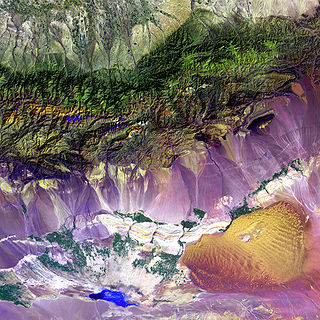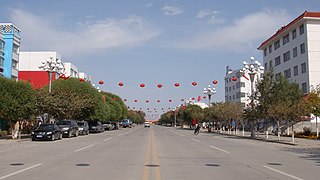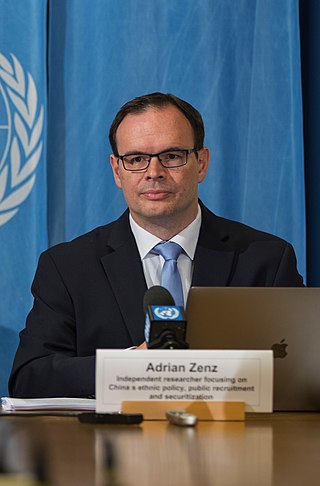
The Turpan Depression or Turfan Depression, is a fault-bounded trough located around and south of the city-oasis of Turpan, in the Xinjiang Autonomous Region in far Western China, about 150 kilometres (93 mi) southeast of the regional capital Ürümqi. It includes Lake Ayding, −154 metres (−505 ft), the second or third lowest depression on Earth. By some measures, it is also the hottest and driest area in China during the summer.

Eldorado Gold Corporation is a Canadian company that owns and operates gold mines in Turkey, Greece and Canada. Since its merger with European Goldfields in 2011 the company has been pursuing the development of the Skouries mine, Olympias mine and Stratoni mine in Greece. The company previously developed and operated gold mines in China, Brazil and Mexico. Headquartered in Vancouver and listed on the Toronto and New York Stock Exchanges, Eldorado Gold has developed and operated assets from several merged companies HRC Developments Corporation, Afcan Mining Corporation, Sino Gold Mining, Brazauro Resources, Integra Gold, as well as European Goldfields.

Hami or Kumul is a prefecture-level city in eastern Xinjiang, China. It is well known for sweet Hami melons. In early 2016, the former Hami county-level city merged with Hami Prefecture to form the Hami prefecture-level city with the county-level city becoming Yizhou District. Since the Han dynasty, Hami has been known for its production of agricultural products and raw resources.

Fuhai County as the official romanized name, also transliterated from Uyghur as Burultokay County, is a county in the Xinjiang Uyghur Autonomous Region and is under the administration of the Altay Prefecture. It has an area of 33,319.38 km2 (12,864.68 sq mi) with a population of 65,600. The county's postcode is 836400.

Qitai County as the official romanized name, also transliterated from Uyghur as Guqung County or Gucheng County, is a county in the Xinjiang Uyghur Autonomous Region of China under the administration of the Changji Hui Autonomous Prefecture. It covers an area of 16,641 square kilometres (6,425 sq mi) and as of the 2002 census had a population of 230,000.

Gold mining in the People's Republic of China has made that country the world's largest gold producer. In 2022, China mined 403 tons of gold. Data indicates the marginal costs are often above the world price for gold. For the year 2007, gold output rose 12% from 2006 to 276 tonnes to become the world's largest for the first time—overtaking South Africa, which produced 272 tonnes. South Africa had until then been the largest for 101 years straight since 1905. The major reasons for this change in position had been due to South African production falling by 50% in the past decade as production costs there have risen, more stringent safety regulations have been implemented, and existing mines have become depleted. In 2014, production had increased to 450 tonnes.

Xinjiang, officially the Xinjiang Uygur Autonomous Region, is an autonomous region of the People's Republic of China (PRC), located in the northwest of the country at the crossroads of Central Asia and East Asia. Being the largest province-level division of China by area and the 8th-largest country subdivision in the world, Xinjiang spans over 1.6 million square kilometres (620,000 sq mi) and has about 25 million inhabitants. Xinjiang borders the countries of Afghanistan, India, Kazakhstan, Kyrgyzstan, Mongolia, Pakistan, Russia, and Tajikistan. The rugged Karakoram, Kunlun and Tian Shan mountain ranges occupy much of Xinjiang's borders, as well as its western and southern regions. The Aksai Chin and Trans-Karakoram Tract regions are claimed by India but administered by China. Xinjiang also borders the Tibet Autonomous Region and the provinces of Gansu and Qinghai. The most well-known route of the historic Silk Road ran through the territory from the east to its northwestern border.
Canadian Solar Inc. is a publicly traded company that manufactures solar PV modules and runs large scale solar projects.
Seabridge Gold is a Canadian company that is pursuing the development of the Kerr Sulphurets Mitchell ("KSM") gold-silver-molybdenum-copper mine in northwest British Columbia. Headquartered in Toronto, the company is listed on the Toronto Stock Exchange and the New York Stock Exchange. The company was founded in 1979 as a mining company but, in 1999, re-organized to pursue exploration and development of gold deposits with a new board of directors and new management team. Of the mineral properties acquired between 2000 and 2002, the KSM project emerged as its core asset. The project advanced through its preliminary feasibility study and received its environmental assessment approval in 2014. The Company has completed new development plans and is actively looking for a partner to co-develop the project. KSM is one of the world’s largest gold/copper projects as measured by mineral reserves and resources. Seabridge also owns several other mineral properties, including the Courageous Lake project in Northwest Territories, the Iskut project in northwest BC, the Snowstorm project in Nevada and the 3 Aces project in Canada’s Yukon.
Esquel Group is a Hong Kong–based textile and apparel manufacturer. It is the world's largest woven shirt maker, producing about 100 million shirts annually. Esquel supplies textile to companies such as Nike, Tommy Hilfiger, Li Ning, ANTA Sports, Fila, Giordano, Muji.

The Xinjiang internment camps, officially called vocational education and training centers by the government of China, are internment camps operated by the government of Xinjiang and the Chinese Communist Party Provincial Standing Committee. Human Rights Watch says that they have been used to indoctrinate Uyghurs and other Muslims since 2017 as part of a "people's war on terror", a policy announced in 2014. Thirty-seven countries have expressed support for China's government for "counter-terrorism and deradicalization measures", including countries such as Russia, Saudi Arabia, Cuba, and Venezuela; meanwhile 22 or 43 countries, depending on source, have called on China to respect the human rights of the Uyghur community, including countries such as Canada, Germany, Turkey and Japan. Xinjiang internment camps have been described as "the most extreme example of China's inhumane policies against Uighurs". The camps have been criticized by the subcommittee of the Canadian House of Commons Standing Committee on Foreign Affairs and International Development for persecution of Uyghurs in China, including mistreatment, rape, torture, and genocide.

The Junggar Basin, also known as the Dzungarian Basin or Zungarian Basin, is one of the largest sedimentary basins in Northwest China. It is located in Dzungaria in northern Xinjiang, and enclosed by the Tarbagatai Mountains of Kazakhstan in the northwest, the Altai Mountains of Mongolia in the northeast, and the Heavenly Mountains in the south. The geology of Junggar Basin mainly consists of sedimentary rocks underlain by igneous and metamorphic basement rocks. The basement of the basin was largely formed during the development of the Pangea supercontinent during complex tectonic events from Precambrian to late Paleozoic time. The basin developed as a series of foreland basins – in other words, basins developing immediately in front of growing mountain ranges – from Permian time to the Quaternary period. The basin's preserved sedimentary records show that the climate during the Mesozoic era was marked by a transition from humid to arid conditions as monsoonal climatic effects waned. The Junggar basin is rich in geological resources due to effects of volcanism and sedimentary deposition. According to Guinness World Records it is a land location remotest from open sea with great-circle distance of 2,648 km from the nearest open sea at 46°16′8″N86°40′2″E.

Since 2014, the Chinese government has committed a series of ongoing human rights abuses against Uyghurs and other Turkic Muslim minorities in Xinjiang which has often been characterized as persecution or as genocide. There have been reports of mass arbitrary arrests and detention, torture, mass surveillance, cultural and religious persecution, family separation, forced labor, sexual violence, and violations of reproductive rights.

Adrian Nikolaus Zenz is a German anthropologist known for his studies of the Xinjiang internment camps and persecution of Uyghurs in China. He is a director and senior fellow in China studies at the Victims of Communism Memorial Foundation, an anti-communist think tank established by the US government and based in Washington, DC.

The Uyghur Forced Labor Prevention Act is a United States federal law that changed U.S. policy on China's Xinjiang Uyghur Autonomous Region with the goal of ensuring that American entities are not funding forced labor among ethnic minorities in the region. It was signed into law in December 2021 and took effect in June 2022.
An orogenic gold deposit is a type of hydrothermal mineral deposit. More than 75% of the gold recovered by humans through history belongs to the class of orogenic gold deposits. Rock structure is the primary control of orogenic gold mineralization at all scales, as it controls both the transport and deposition processes of the mineralized fluids, creating structural pathways of high permeability and focusing deposition to structurally controlled locations.

Xinjiang is the leading producer of cotton in China, accounting for about 20% of the world's cotton production and 80% of China's domestic cotton production. Critics of the industry's practices have alleged widespread human rights abuses, prompting global boycotts. China rejects accusations that any human rights abuses occur either within the Xinjiang cotton industry or within China overall.

The Central Asian Orogenic Belt (CAOB), also called the Altaids, is one of the world's largest Phanerozoic accretionary orogens, and thus a leading laboratory of geologically recent crustal growth. The orogenic belt is bounded by the East European Craton and the North China Craton in the Northwest-Southeast direction, as well as Siberia Craton and Tarim Craton in the Northeast-Southwest direction. It formed by ocean closures during Neoproterozoic to the late Phanerozoic time, from around 750 to 150 Ma. Like many other accretionary orogenic belts, the Central Asian Orogenic Belt consists of a huge amount of magmatic arcs, arc-related basins, accretionary complexes, seamounts, continental fragments and ophiolites. It is also considered a relatively distinctive collisional orogenic belt because widespread subduction-accretion complexes and arc magmatic rocks can be found in the region, but collision-related foreland basins are not common.

Dynasty Gold Corp. is a Canadian mining company that operates mainly in Canada and China.
The Canadian Ombudsperson for Responsible Enterprise (CORE) is a Canadian ombudsman that investigates ethical violations.














